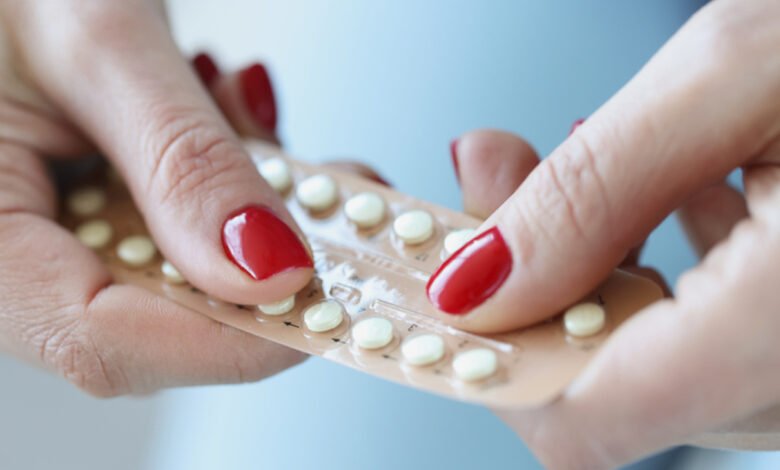I Quite Birth Control: Here’s How It Affected My Vaginal Health

I have been on oral contraceptives for nearly 15 years—that is, until six months ago when I decided to stop taking birth control altogether and experience my body without the effects of the prescription. This decision wasn’t really a hard one for me to make, but it was a little scary, and after being on birth control pills for so long, I was definitely nervous to stop taking them.
Through conversations with my doctor, I was told that since my cycles were irregular before going on the pill, they would likely be just the same once I stopped taking the pills. Additionally, it had been so long since I experienced PMS symptoms without birth control that I didn’t really know what to expect. I thought about going off of birth control for at least a year, if not longer. But, out of habit and uncertainty about what to expect, I continued to take them until I knew it was time. Then, one day earlier this summer, I decided it was time to listen to my body and experience life without the hormone medication.
Up ahead, I share how going off birth control affected my body, plus share insights on the benefits and side effects of prolonged use of oral contraceptives and how birth control impacts vaginal health.
What Happens When You Go Off Birth Control
A few days after going off of the pill, I experienced something called a withdrawal bleed. According to Courtney Cortez, MSN, WHNP-BC, a board-certified Women’s Health Nurse Practitioner and HerMD, a withdrawal bleed might appear to be a period, but it’s not actually regulated by your cycle. “A withdrawal bleed is the vaginal bleeding that occurs once birth control is stopped,” she explains. “It is due to the abrupt withdrawal of prescription hormones.” If you’re on the birth control pill, this withdrawal bleed is nothing new—it’s actually the same “period” you experience during the sugar pill section of your birth control pack.
Once my withdrawal bleed ended, I started to experience some changes in my body. For me, the biggest change I experienced in the first month was mental clarity, decreased anxiety, and an overall sense of calm. Within a couple of weeks of being birth control-free, my mind felt sharper and less foggy, and I didn’t have this underlying stress that often made me feel a little anxious.
With that said, birth control pills impact individuals differently, and while some note anxiety as a personal side effect of birth control, going off a hormonal contraceptive can actually cause anxiety in others. And, while brain fog is considered a possible side effect of birth control, more research is needed to determine how much this impacts individuals.
What Happens When You’re On Birth Control for a Long Time
As someone who was on birth control for nearly 15 years, I was often a little concerned about how it impacted my body, especially my fertility. When it comes to being on birth control for a prolonged period of time, the good often outway the bad (more on that in a minute). However, there are some precautions that are worth considering. First and foremost, Cortez says it’s vital that a patient makes sure it’s safe for them to be on oral birth control. “If a patient has risk factors for cardiovascular disease, cancer, blood clots, etc., it may increase risk,” she explains, which is why it’s important to discuss your health history with a doctor before deciding to go on birth control in the first place.
According to research, taking birth control pills over a long period of time can raise your risk of blood clots and a heart attack after age 35, which is why some doctors might advise bloodwork before refilling a prescription. Additionally, prolonged use of birth control pills might also put individuals at a higher risk of some types of cancers, including cervical cancer—though more research is needed to determine the level of risk.
The Benefits of Birth Control for vaginal health
Despite some potential risks, there are also benefits of being on birth control, including the benefits of long-term use. “Birth control stabilizes the mood, reduces painful cycles, helps eliminate acne, and reduces the effects of endometriosis and PCOS,” says Cortez. She adds that long-term use of birth control can actually help with fertility—some research shows that women who used birth control pills for five years were more likely to get pregnant within a six-month period after going off the contraceptive—protect bone health, and can reduce the risk of ovarian cancer by between 30 and 50 percent.
The Vaginal Health Side Effects of Birth Control
As we discussed, birth control comes with a range of overall benefits and side effects. But it’s also important to consider the way vaginal health might be impacted when choosing to stay on or go off of birth control. According to Cortez, birth control can decrease vaginal lubrication and libido, so going off of oral contraceptives can improve both.
Additionally, birth control pills might impact vaginal pH in some women. An imbalanced pH puts you at greater risk of yeast and Bacterial Vaginosis (BV) overgrowth, which might, as a result, cause yeast infections, itchiness, dryness, and general discomfort.
The Takeaway
Overall, going off of birth control is a personal choice and one that is best decided with insight from a doctor. While there are some perks to long-term oral contraceptive use, taking birth control for an extended period of time can put some individuals at a higher risk of blood clots and heart attack after age 35. And, in many cases, birth control can be a major positive in women’s health journey as it can improve symptoms of PMS and skin conditions like acne. Additionally, it can reduce the effects of endometriosis and PCOS, as well as lower the risk of ovarian cancer by between 30 and 50 percent.
Source link
#Birth #Control #Heres #Affected #Vaginal #Health



